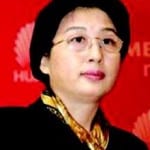Leading ladies
A survey we ran last year confirmed that men remain overwhelmingly dominant at the most senior level within the mobile industry. So MCI and Telecoms.com set out to compile a listing featuring some of the most influential women in the sector.
June 24, 2010


influential-women-globe
Just Who Are The Most Influential Women In The Industry?
A survey we ran last year confirmed that men remain overwhelmingly dominant at the most senior level within the mobile industry. So MCI and Telecoms.com set out to compile a listing featuring some of the most influential women in the sector.
In August 2009, MCI and Telecoms.com published a list of 40 people in the mobile industry who we considered particularly influential and worthy of note. The list was compiled from our own research as well as suggestions from our readers within the industry. A good number of the people who made the list would, perhaps, have seemed obvious inclusions. There are certain organisations, after all, whose weight within the industry is such that those at their helm commanded automatic inclusion.
If there was an overwhelming takeaway from the project, though, it was the absence of female executives on the list. Only one woman was present, EU Commissioner Viviane Reding, a woman who has imposed herself on the European mobile industry with undeniable— and often unwelcome—conviction.
The rest were all male. So we decided this year to apply a filter and search out the most senior women in the industry. We’ve spent enough years working within the mobile community to know that there are plenty of female executives out there but we wanted to know what jobs the top of the pile are occupying, and within which organisations.
The first interesting result of launching this project was that the number of submissions for entry onto the list far exceeded the number from last year, when we were ranking people irrespective of gender. It wasn’t all PR agencies nominating their clients (although there were examples of this) and nor, by any means, was it all women nominating other women. What we took from this was the notion that there is a feeling within the industry at large, from men and women alike, that the progression of female executives is something that needs to be both recognised and encouraged by all.
The products and services that this industry creates are among the most socially and technologically advanced to which the public has access. So perhaps it should not be surprising that there are a good number of industry participants who want their sector to be seen to be progressive in other ways as well.
This exercise revealed a large number of women in senior positions within the industry, if not a large number at the very top of powerful organisations. Of those we spoke to, most were keen to play down gender as an issue requiring more attention than any other. Diversity is very important, it was universally agreed, but gender in particular should not be singled out. A good number of the executives featured here reported that gender had not been an issue in their progression, and that their experience as participant and observer suggested that talent and application are far more important to prospective employers than anything else. Nonetheless, most also talked of the importance of generating more enthusiasm among school-age girls for engineering and science.
As one executive put it: “Unfortunately, the low number of girls graduating from top universities with engineering qualifications is a challenge. It means that we’re not only depriving the industry of a valuable resource, but also perpetuating the current imbalance into the future.”
But most of the executives we spoke to were unwilling, or felt it unnecessary, to bemoan the plight of women bidding for the most senior positions in the industry. That said, one did report that, anecdotally, she had seen a number of women opt to start their own companies having become frustrated with the glass ceiling they had encountered at established players. So perhaps an evolutionary progress towards balance has already begun.
This list is presented in alphabetical order. To have your say on the list and to suggest others who you believe should have been included, please use the comments form at the foot of this or any other article in the series.

Muriel_Anton
Muriel Anton, chief executive officer, Vodafone Czech Republic
Carol_Bartz
Carol Bartz, president and chief executive officer, Yahoo
robin_bienfait
Robin Bienfait, chief information officer, Research In Motion
Arieso
Shirin Dehghan, co-founder and chief executive, Arieso
teresa_elder
Teresa Elder, president of strategic partnerships and wholesale, Clearwire
huangwenlin
Huang Wenlin, vice president, China Mobile
Peggyjohnson
Peggy Johnson, senior vice president, Americas and India, Qualcomm
lucylombardi
Lucy Lombardi, VP international groups & standards, Telecom Italia
Mary_McDowell
Mary McDowell, head of Mobile Phones, Nokia
jeni.mundy
Jeni Mundy, chief technical officer, Vodafone UK
bettymwangi-thuo
Betty Mwangi-Thuo, chief new products officer, Safaricom
rima_qureshi
Rima Qureshi, senior vice president and head of CDMA, Ericsson
vivianereding
Viviane Reding, European Commissioner for the Information Society and Media
kristinrinne
Kristin Rinne, senior vice president for architecture and planning, AT&T
lilianaSolomon
Liliana Solomon, chief executive, Vodafone Romania
Strezynska
Anna Strezynska, president of the office of electronic Communications, Poland
Sue_Spradley
Sue Spradley, head of north America region, Nokia Siemens Networks
StephanieTilenius
Stephanie Tilenius, vice president, e-commerce, Google
sunyafang
Sun Yafang, chairperson, Huawei
Cher-Wang
Cher Wang, chairman and co-founder, HTC
Padmasree_Warrior
Padmasree Warrior, chief technology officer, Cisco
Susan_Wojcicki
Susan Wojcicki, vice president of product management, GoogleRead more about:
DiscussionAbout the Author
You May Also Like










.png?width=300&auto=webp&quality=80&disable=upscale)


_1.jpg?width=300&auto=webp&quality=80&disable=upscale)